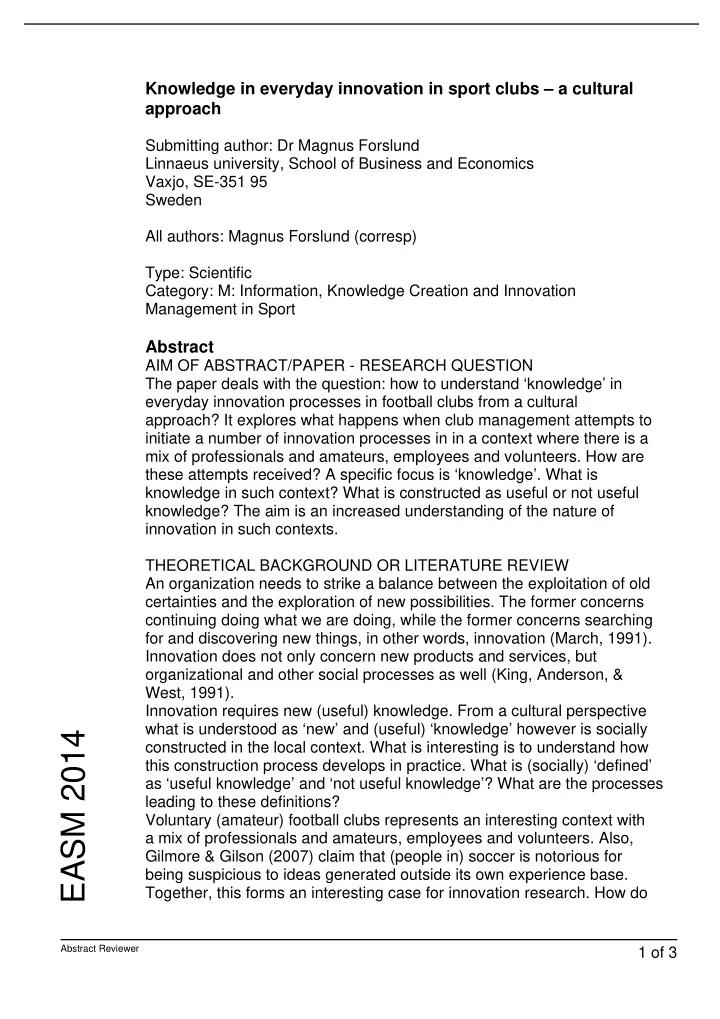

Knowledge in everyday innovation in sport clubs – a cultural approach Submitting author: Dr Magnus Forslund Linnaeus university, School of Business and Economics Vaxjo, SE-351 95 Sweden All authors: Magnus Forslund (corresp) Type: Scientific Category: M: Information, Knowledge Creation and Innovation Management in Sport Abstract AIM OF ABSTRACT/PAPER - RESEARCH QUESTION� The paper deals with the question: how to understand ‘knowledge’ in everyday innovation processes in football clubs from a cultural approach? It explores what happens when club management attempts to initiate a number of innovation processes in in a context where there is a mix of professionals and amateurs, employees and volunteers. How are these attempts received? A specific focus is ‘knowledge’. What is knowledge in such context? What is constructed as useful or not useful knowledge? The aim is an increased understanding of the nature of innovation in such contexts. � � THEORETICAL BACKGROUND OR LITERATURE REVIEW� An organization needs to strike a balance between the exploitation of old certainties and the exploration of new possibilities. The former concerns continuing doing what we are doing, while the former concerns searching for and discovering new things, in other words, innovation (March, 1991). Innovation does not only concern new products and services, but organizational and other social processes as well (King, Anderson, & West, 1991). � Innovation requires new (useful) knowledge. From a cultural perspective what is understood as ‘new’ and (useful) ‘knowledge’ however is socially EASM 2014 constructed in the local context. What is interesting is to understand how this construction process develops in practice. What is (socially) ‘defined’ as ‘useful knowledge’ and ‘not useful knowledge’? What are the processes leading to these definitions?� Voluntary (amateur) football clubs represents an interesting context with a mix of professionals and amateurs, employees and volunteers. Also, Gilmore & Gilson (2007) claim that (people in) soccer is notorious for being suspicious to ideas generated outside its own experience base. Together, this forms an interesting case for innovation research. How do Abstract Reviewer 1 of 3
you accomplish innovation in such a situation? Is it possible to innovate by bringing in explicit knowledge from the outside? If not, how do such processes leading to failure develop? What are the reasons for failure?� Ogbonna & Harris (2013) studies cultural perpetuation in a British Premier League football club, illustrating how a cultural change attempt aiming at increased professionalization is resisted. They do not focus the concept of knowledge and also describes the case from a general level. This paper adds to previous research by focusing knowledge in the micro- processes of everyday innovation in a voluntary football club. � � METHODOLOGY, RESEARCH DESIGN AND DATA ANALYSIS� This is a five year long ethnographic study of a Swedish voluntary football club. On a general level, doing an ethnography means studying culture(s) searching for meanings of different events and things and how these meanings are created. During the study the author was deeply involved in the club in different positions, for example as a member of the board. A broad range of methods was used in order to create a thick description (Geertz, 1973). The empirical material includes documents, interviews, participant observations, observations, introspection, informal talks, and webpages. This article is focusing one aspect in a bigger study concerning voluntary football club management. Here, focus is on understanding knowledge in innovation processes. When attempting innovation, what knowledge was deemed ’useful’ and ’not useful’ and why?� � RESULTS, DISCUSSION AND IMPLICATIONS/CONCLUSIONS� The study suggests that the question of knowledge in everyday innovation processes in football clubs is complex. What is understood as ‘useful or ‘not useful’ knowledge is a result of local culture and something not easily discerned from the outside. What in many other contexts is considered as ‘useful’ knowledge can be framed as ‘not useful’ in a voluntary football club. The study discusses reasons for this and how this influences the innovation process. This has implications for the education and practice of sport managers. References Crevani, L., Palm, K., & Schilling, A. (2011). Innovation management in service firms: A research agenda. Service Business, 5(2), 177-193. � Gilmore, S., & Gilson, C. (2007). Finding form: Elite sports and the EASM 2014 business of change. Journal of Organizational Change Management, 20(3), 409-428. � King, N., Anderson, N., & West, M. A. (1991). Organizational innovation in the uk: A case study of perceptions and processes. Work & Stress, 5(4), 331 - 339. � March, J. G. (1991). Exploration and exploitation in organizational learning. Organization Science(1), 71. doi: 10.2307/2634940� Ogbonna, E., & Harris, L. C. (2013). Organizational cultural perpetuation: A case study of an english premier league football club. British Journal of Abstract Reviewer 2 of 3
Management, n/a-n/a. doi: 10.1111/1467-8551.12037 EASM 2014 Abstract Reviewer 3 of 3
Recommend
More recommend